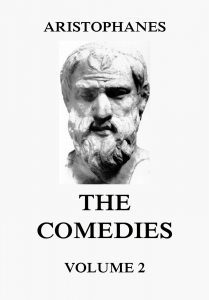The Comedies Vol. 2 – Aristophanes
The so-called old comedy, of which Aristophanes is the only surviving representative, flourished at the time of the Peloponnesian War which shook Greek civilization. There is no good single modern analogue of the old comedy. It is a blend of Shakespeare’s ‘Midsummer Night’s Dream’ with Bernard Shaw. It is extravaganza combined with the dramatic criticism of ideas and set off with occasional flights of true poetry. So at least it appears in Aristophanes, who in native genius and spontaneous mastery of expression ranks with the four or five supreme poets of Greece.
This is volume two out of two and includes:
Lysistrata
The Thesmophoriazusæ
The Frogs
The Ecclesiazusæ
Plutus
Format: Paperback.
The Comedies Vol. 2.
ISBN: 9783849692933
Available at amazon.com and other venues.
Biography of Aristophanes (from Wikipedia):
Aristophanes ( c. 446 – c. 386 BC), son of Philippus, of the deme Kydathenaion (Latin: Cydathenaeum), was a comic playwright of ancient Athens. Eleven of his forty plays survive virtually complete. These, together with fragments of some of his other plays, provide the only real examples of a genre of comic drama known as Old Comedy, and are used to define it.
Also known as the Father of Comedy and the Prince of Ancient Comedy, Aristophanes has been said to recreate the life of ancient Athens more convincingly than any other author. His powers of ridicule were feared and acknowledged by influential contemporaries; Plato singled out Aristophanes’ play The Clouds as slander that contributed to the trial and subsequent condemning to death of Socrates although other satirical playwrights had also caricatured the philosopher.
His second play, The Babylonians (now lost), was denounced by the demagogue Cleon as a slander against the Athenian polis. It is possible that the case was argued in court but details of the trial are not recorded and Aristophanes caricatured Cleon mercilessly in his subsequent plays, especially The Knights, the first of many plays that he directed himself. “In my opinion,” he says through the Chorus in that play, “the author-director of comedies has the hardest job of all.” (κωμῳδοδιδασκαλίαν εἶναι χαλεπώτατον ἔργον ἁπάντων)
(The text of the last section was taken from a Wikipedia entry and is available under the Creative Commons Attribution-ShareAlike License.)
Publisher’s Note: This book is printed and distributed by Createspace a DBA of On-Demand Publishing LLC and is typically not available anywhere else than in stores owned and operated by Amazon or Createspace.

